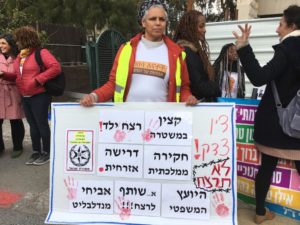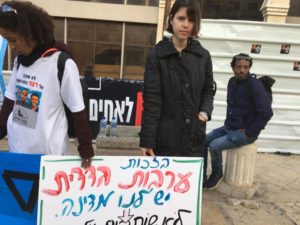Marchers aim to counteract the narrative that killing Solomon Tekah was an act of self-defense
The emotion was palpable as about a hundred protesters marched from the Justice Ministry to police headquarters in Jerusalem on Tuesday, taking turns chanting “Justice for Solomon Tekah” and naming other Ethiopian Israelis killed by police, such as Yehuda Biadga.
Protesters at a demonstration in Jerusalem call for justice for Ethiopian Israelis killed by the police, January 28. (Tara Kavaler)
As the protesters made their way through the streets, traffic was disrupted. But a number of drivers seemed not to mind the inconvenience, and repeatedly honked their horns to signal their sympathy for the cause. Onlooking pedestrians – including both Jews and Arabs – also expressed their support, and a few of them joined the protest, augmenting its numbers.
The demonstrators are concerned that the ministry will bring relatively lenient charges of negligent homicide against the police officer who killed Solomon Tekah, a 19-year-old unarmed Ethiopian Israeli, last June.
The officer, who was off duty at the time, killed Tekah in Haifa’s Kiryat Haim neighborhood. The policeman says he acted in self-defense after he identified himself and youths began to throw stones at him. Other youths and a witness later said the officer was not under attack.
Tekah’s father, Worke Tekah, told The Media Line that his son was someone who had “great respect for people. … He was very helpful and caring. … Everyone liked him.” He added that “this protest is not just for me. It’s for everyone who cares for a free life here in Israel.”
Of all the charges the Justice Ministry is considering against the officer, negligent homicide carries the lightest sentence, up to 12 years in prison. Manslaughter, on the other hand, can be punished by up to 20 years in jail.
Ethiopian Israeli activist Ziva Mekonen Degu told The Media Line that her involvement in community activism began in 2014, when she heard about the case of Yosef Salamsa. Activists and Salamsa’s family say that Salamsa took his own life after being subjected to repeated abuse by police officers, a charge that the police deny.
Mekonen Degu said she hadn’t seen any change since then. She’s worried that unnecessary deaths of Ethiopian youth at the hands of the police will continue if the officer is not indicted on serious charges and convicted. “This isn’t political,” Mekonen Degu said, “We’re not affiliated with any party. It’s about justice.”

Activist Ziva Mekonen Degu, Jerusalem, January 28: “This isn’t political. … It’s about justice.” (Tara Kavaler)
The protest was organized by the Standing Watch Against Police Brutality group, which was established immediately after Tekah’s death. The group also held demonstrations every night from July through November outside the Jerusalem home of then-State Attorney Shai Nitzan, who led Israel’s prosecutorial service until his term ended in December.
The current protests were prompted by recent reports in the Hebrew language media, publishing part of the transcript of the investigation into the police officer, which highlighted him saying he had felt his life was threatened by Tekah and his friends. Members of the Ethiopian Israeli community are concerned that the self-defense narrative playing out in the press is a precursor to an unjust outcome.
“The media, and consequently the rest of the public, believe that the police had no choice but to shoot. … That prepares the public for the exoneration of the officer,” Mazal Bisawer, spokesperson for the Association of Ethiopian Jews (AEJ), told The Media Line.
“There are concerns within the community that Solomon will not get justice, just like the other 11,” she said, referring to the number of Ethiopian Israelis killed by police over the last two decades. None of the officers involved has been convicted of a crime.
Bisawer argues that missing from the public discourse is a conversation about race.
“No one talks about the racial profiling that initiated the situation. [The policeman] would never draw a gun against a 19-year-old kid in a white neighborhood,” she said. “He was a police officer with years of training and was also in an [army] unit on the border, so you would expect him to have sufficient experience and instruction to be able to confront a teenager with a rock without killing him.”
Tekah’s death led to three days of protests and rioting in early July that shut down highways and parts of major cities, including Tel Aviv.
The demonstrations took place amid increasing disillusionment among Ethiopian Israelis, especially younger ones, with the government over perceived failure to deal with issues of police profiling and violence, as well as racism.
Shira Bahat, 23, a non-Ethiopian resident of Jerusalem who joined the protest, told The Media Line that “murders by police are just an expression of systematic racism, and this is also a protest against that.” When asked why she decided to participate in the march, Bahat answered, “The question you should be asking me is, why aren’t more people joining the protests, not why am I joining.”

Protester Shira Bahat, Jerusalem, January 28: “The question you should be asking me is, why aren’t more people joining the protests, not why am I joining.” (Tara Kavaler)
Bisawer said the current protest was particularly significant because of the Justice Ministry’s record on cases like Tekah’s.
She is alluding to cases like that of Yehuda Biadga, the first of two Ethiopian Israelis killed by police last year.
Biadga, 24, suffered from mental illness. He was killed in Bat Yam, south of Tel Aviv, while carrying a knife, by a police officer who also claimed self-defense. However, there were people at the scene who contradict the officer’s account. According to several sources, the policeman is still on the job today.
“After the demonstrations [in July after Tekah’s death], young Ethiopians blamed for burning cars were put in jail. The person who killed my son is out and nothing happened to him,” Atalay Biadga, Yehuda’s father, told The Media Line last week. “What’s a car? It’s steel, it’s not a human being.”
Shula Mola, an educator and former chairperson of the AEJ, is also a member of the Standing Watch Against Police Brutality group. She hopes that the march will help make more Israelis aware of the difficulties Ethiopian Israelis face.
“We need to get Israeli society to be aware that as a mother of a young [Ethiopian Israeli] adult, I tell my son every time he goes out that if the policeman stops you, be polite, answer his questions, show him your ID and then call me,” Mola told the Media Line. “Most Israelis don’t know about this because they’ve never had to do it.
“Educating people is important so they can change their behavior and their speech,” she continued. “The people we want to reach are teachers in schools, people who work in the Justice Ministry, and the average person who works in a bank.”
Asked if he thought there would be justice for his son, Worke Tekah said: “If [those deciding the case in the Justice Ministry and judiciary] are not racist and they want to do the right thing, then I’m hopeful that we can get to the right decision.”
The demonstrators’ hope is that the Justice Ministry’s decision will lead to the first-ever criminal conviction of a police officer who killed an Ethiopian Israeli.
Steven Ganot contributed to this report.